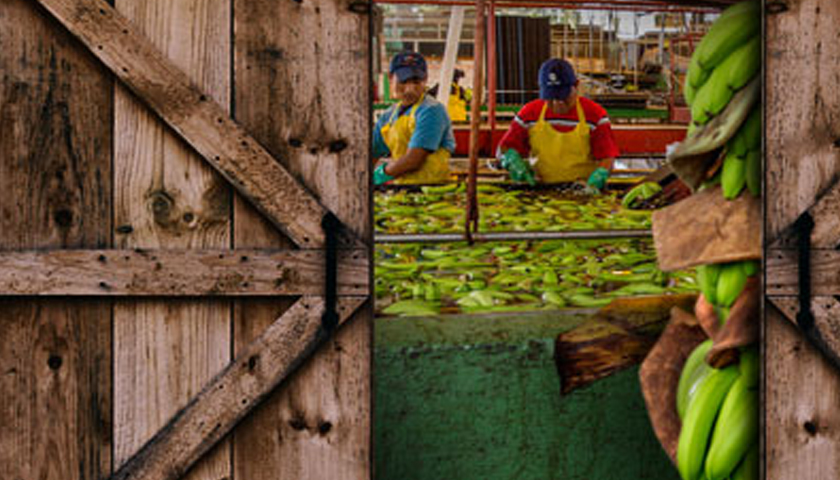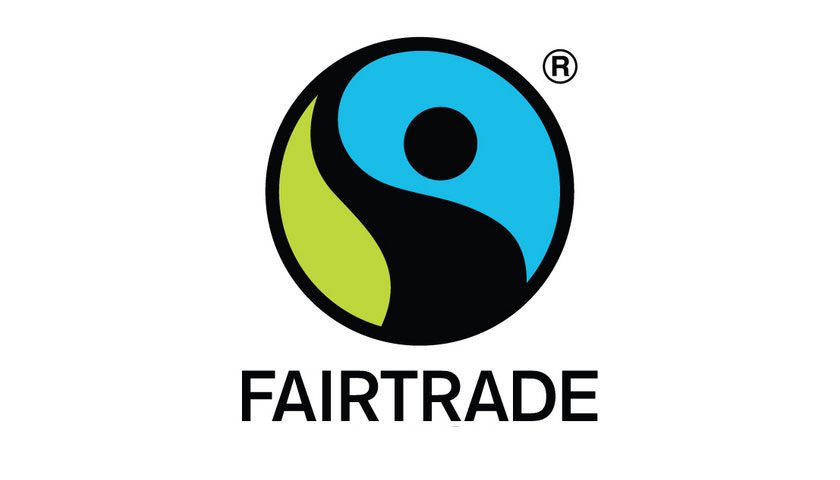Giant double doorway opens onto a banana washing station in rural Panama to mark the start of Fairtrade Fortnight 2018.
On the day new research reveals half of Brits are unaware of exploitation in the food chain, a giant double doorway opening onto a scene from a banana farm was unveiled on the Millennium Footbridge, London.
The stunt marked the start of the Fairtrade Fortnight “Come On In” campaign, calling on the public to stand with farmers to close the door on exploitation and break the stranglehold of poverty prices. Celebrity chef, food writer and author Tess Ward was on hand to show her support and give out Fairtrade bananas while passers-by were invited to step onto a Panama banana farm by virtue of a new immersive 360 virtual reality film.
This year we collectively chomped through a staggering 820,000 tonnes of bananas, eating on average 100 bananas each. Yet it’s a scandalous reality that millions of farmers and workers are still being ripped off, despite working hard to provide the products we love. They face unfairness in global trade that is rooted in centuries of exploitation.
The banana industry provides employment for tens of thousands of people in Latin America, the Caribbean, south-east Asia and West Africa.[2] The past 15 years have seen a 40% fall in the typical UK retail price of loose bananas while costs of production have doubled in some regions. Together, these factors have a human cost, meaning workers on non-Fairtrade plantations often have to contend with basic housing, poor working conditions and a lack of job security and continue to be undermined by late cancellations and delayed payments from unscrupulous buyers.
But we could all unconsciously be participating in this exploitation, data shows. The research published today revealed that over a quarter of Brits (26%) admit they never think about who produces their food and drink, 3% less than last year. Almost half of those asked say they are unaware of exploitation in the food chain. And 88% of shoppers put price and quality as key factors in their decisions when purchasing food, above location (71%) and a store’s ethical credentials (49%).
Against this backdrop, Fairtrade has shown an increase in both support and sales, as independent data from Kantar Worldpanel showed a 7% growth in the 52 weeks ending 31 December 2017 as more shoppers and businesses get behind Fairtrade. This growth means many more farmers are getting a better deal with better incomes though Fairtrade, which is why the organisation is spending this Fairtrade Fortnight asking more people in the UK to come on in to Fairtrade and help forge a fairer future for the farmers and workers relied upon for so many of our favourite products.
This increased level of public support in 2017 and the first quarter of 2018 show that fairness and Fairtrade matters for the British public and British businesses, which is why the Fairtrade Foundation is calling on Commonwealth leaders this Fairtrade Fortnight to put an end to exploitative trade.
To help people make a direct connection between their shopping choices and the livelihoods of the people who produce our food, the Fairtrade Foundation has teamed up with banana farmer Marcial Quintero, a member of Coobana in Panama, and three other Fairtrade farmers, who will speak at around 100 events around the UK which have been carefully designed to highlight what can be achieved by farmers when shoppers buy enough Fairtrade products, and to see what exploitation looks like when trade doesn’t deliver. Thousands of breakfasts and bake-offs are due to be held as more people find out more about Fairtrade.
Marcial Quintero said: “Before joining Fairtrade we didn’t see any benefits, development or profit. The price we used to receive per box wasn’t enough to cover our costs – and for 17 years the price didn’t change. Since starting with Fairtrade it’s made a mega-revolution in our lives.”
Yet across the globe, Marcial and hard-working producers like him are unravelling this legacy of exploitation. They’re fighting for a fair deal, supported by Fairtrade, earning their way out of poverty and transforming their communities.
Chef, food writer and author Tess Ward and Marcial Quintero were at today’s launch to show their support for the campaign.
Tess Ward said: “Together we’re stronger, and more people choosing, sharing and shouting about Fairtrade in the UK means more power to producers like Marcial to break the stranglehold of poverty prices.”
Other influencers and ambassadors supporting the campaign include Allegra McEvedy, Rosie Birkett, Laura Jackson, Lily Vanilli, Emily Ezekiel and Anna Barnett.
Cheryl McGechie, Director of Public Engagement at the Fairtrade Foundation said, “Most British consumers don’t realise the reality behind the food we eat nor do they make the connection between what they buy and who it was grown by. Although Fairtrade provides a vital safety net that can help lift farmers and workers out of poverty, we need more people to choose Fairtrade, as every item that is sold on Fairtrade terms means more money for the producers who grow some of our favourite foods”

